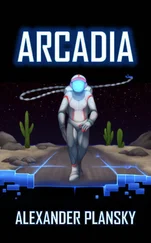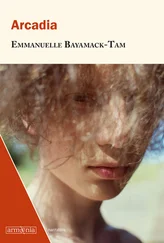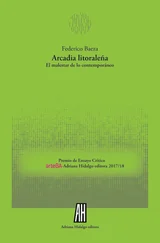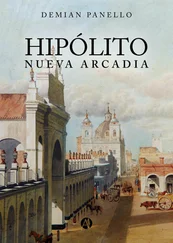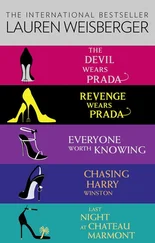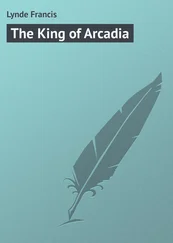Lauren Groff - Arcadia
Здесь есть возможность читать онлайн «Lauren Groff - Arcadia» весь текст электронной книги совершенно бесплатно (целиком полную версию без сокращений). В некоторых случаях можно слушать аудио, скачать через торрент в формате fb2 и присутствует краткое содержание. Год выпуска: 2012, Издательство: Hachette Books, Жанр: Современная проза, на английском языке. Описание произведения, (предисловие) а так же отзывы посетителей доступны на портале библиотеки ЛибКат.
- Название:Arcadia
- Автор:
- Издательство:Hachette Books
- Жанр:
- Год:2012
- ISBN:нет данных
- Рейтинг книги:3 / 5. Голосов: 1
-
Избранное:Добавить в избранное
- Отзывы:
-
Ваша оценка:
- 60
- 1
- 2
- 3
- 4
- 5
Arcadia: краткое содержание, описание и аннотация
Предлагаем к чтению аннотацию, описание, краткое содержание или предисловие (зависит от того, что написал сам автор книги «Arcadia»). Если вы не нашли необходимую информацию о книге — напишите в комментариях, мы постараемся отыскать её.
Arcadia — читать онлайн бесплатно полную книгу (весь текст) целиком
Ниже представлен текст книги, разбитый по страницам. Система сохранения места последней прочитанной страницы, позволяет с удобством читать онлайн бесплатно книгу «Arcadia», без необходимости каждый раз заново искать на чём Вы остановились. Поставьте закладку, и сможете в любой момент перейти на страницу, на которой закончили чтение.
Интервал:
Закладка:
Bit sees new people who clamber out of other vehicles, stretch their limbs, grin; two dozen Newbies that Handy picked up on the road. One of the Newbies says, . were going to go to the World’s Fair, but, man, this place is way better. . One begins to clap her hands and breaks into song, and the old, familiar Arcadians catch on and they all sing now: ’Mid pleasures and palaces though we may roam, be it ever so humble, there’s no place like home; and at the end everyone hoots and hollers, and Handy leaps up onto the nose of the Blue Bus with little froggy Helle on his shoulders; she clutches her father’s head and kisses and kisses his thinning crown. With a hat made of little girl, with glasses filled with sunlight, Handy starts one of his raps. My good people, my friends, my Free People, he says. How blessed we are by the Great Goodness in the world to find ourselves together again, at last . . Bit is in Hannah’s arms, his hand on her hand, and though everyone else watches Handy, Bit watches the old flowers begin to bloom again in his mother’s cheeks, and he can hardly bear it, it is so good.
When Handy finishes, Abe lifts Bit from Hannah’s arms and puts him on his shoulders, and steps up onto the Blue Bus bumper and shouts: Those of us who stayed behind have made you quite a present. Brace yourselves, all ye who went on tour!
Now Peanut and Tarzan roll out the wheelbarrow they decorated in garlands of spring flowers and apple boughs, and they hustle Handy into it and set off at a dead run, and everyone runs beside and behind, and they take turns jostling Handy over the ground to the circular gravel drive at the base of Arcadia House Hill.
Such billows of laughter! Such long-legged joy! Bit clutches at Abe’s hair as his father gallops beneath him.
Then someone puts a blue bandanna over Handy’s eyes, and they chair-carry him up the steps while he chortles. Abe throws open the great door and whips off the bandanna and scoops up Bit so that Bit can feel the heat and pulse of his father’s body, and Abe turns to everyone massed on the Terraces.
We’ve done it, he shouts. We worked ourselves until we were worn out. But we finished Arcadia House, and there’s room enough for a hundred fifty, maybe more, what with the kids’ dorms and the itty-bitty bedrooms, and we even got ourselves a Library and Eatery and toilets and even a generator for a few hours of light and music in the evenings.
The cheer is the loudest thing that Bit has ever known. A stunned expression grows over Handy’s face. His eyes blink fast. This is. . neat, Handy says, slowly and quietly, to Abe alone.
Under Bit, Abe seems to deflate, his shoulders loosening, his head lowering. The people mass behind them and push them into the Entryway, under the great chandelier. Everyone goes quiet because the room is grand and full of sun, and all the Old Arcadians, the original true believers, remember the holes and the spoor and the darkness, the house splintering around them. This, the contrast, the vastness of the space here that they will never be able to fill, eighty tiny bedrooms, a children’s dormitory; all of this magnificence steals their breath from their lungs.
They scatter. Some find their names on cards on the doors, in Harriet’s calligraphic hand. Others run from room to room to find a place to trade. This new couple wants to be together, these Newbies would like a nicer room, this married couple separated on the road and needs space apart.
Someone shouts from upstairs, They’ve enameled the toilets in gold! In the hilarity that rises and echoes in the house, something in Handy’s face relaxes.
That’s funny, he murmurs. I get it. Diamonds and carbuncles, silver baubles for the kidlets. I read that book, too. Which was it?
More’s Utopia, Abe says, a little sullen.
Yeah, Handy says, and he considers Abe. Then, miracles, Handy breaks into that famous smile of his, that dimpled Buddha beam; it turns plain old Handy into something charming. He puts his hand on Abe’s shoulder, and they lean toward one another for a moment. Handy says, Well, all right, then. All right. It’s a good thing. You’ve done good to keep us together, this is a good thing. A great gift. I thank you, Abraham Stone, with my full heart.
Under the older man’s words, Abe flushes with pleasure and ducks his head like a child.
That afternoon, before the kegs of Oly beer and jugs of red wine, before the Slap-Apple and pies, before Handy and the Free People start to play their music out on the grass during the wild reunion party that will stretch, thanks to the generator, deep through the night and into the quiet parts of the morning, before the kids heap together to sleep like baby chicks in a nest, before all this uproar, they bring up from Ersatz Arcadia everything that they need for the night, the mattresses and sheets and toothbrushes and soap. Everything else will be carried up the next day.
Then someone sets off a Roman candle, and in the after-stink of sulfur, the party begins.
Deep past midnight, Handy stands on a table. How small Handy is, but how he seems to fill all of Arcadia. People are sleeping in the grass. Bit is on a blanket with the other children, their faces smeared with jam and juice, the night turning cold on their limbs. Handy begins to sing, his voice whetted to a knife edge by the Tour. It cuts Bit to wakening when he hears Ole, oleanna, ole, oleanna ole, ole, ole, ole, ole, oleanna. The Norwegian lyrics stretch toward something fleeting, the perfection Handy talks about all the time, dreams about, weaves his seductive words around until it rises, whole and beautiful, before the rest of them. He sings as if today, the day of homecoming, he can reach out to touch what he sees, as if mixed in the victory there is still nostalgia, but for the good present that will soon be the past. Bit looks beyond Handy, to a blanket on the ground where Hannah and Abe are clenched so tight together that it is hard to tell his skin from hers. Yet Bit sees it clearly when he looks at them: even in the darkness, the empty space that keeps the one from the other, the thing the size of a fist, a heart, a loaf, a rose; the size of his sister he’ll never see. Something rips in Bit, and he begins to cry. He cries his overfull heart out, pours it into the dazzled sky. He does so silently. Not yet, noise. It’s still not time.
It is the day after Handy returned, the day before May planting, and the sun is hot and good. The grass is bristling with green. The women move the last of the stuff up from Ersatz Arcadia, and the children nap in the Dormitory. It feels too strange to sleep without his parents’ smell in the sheets, and Bit watches in the window where a lazy fly buzzes on the glass.
Like ants that bear bits of leaf and bread, the women go up the hill with their armfuls of goods. Bit’s breath stops: under the green and welcome arms of the oak, he sees Hannah.
His mother pauses in the courtyard and puts down her pillows. She unfurls her fists. She lifts her arms up and closes her eyes and cants her chin toward the sky.
Hannah, hands full of sun.
A soft dawn, under the copper beech that Felipe loved. Maria sings, her voice broken: Gracias a la vida. Ricky’s hands are clumsy on the guitar. Under the leaves, the skin of Maria’s burnt arms shines, slightly wrinkled, like the bark of the tree above her. Her face looks like Hannah’s does when she is in her thickest sleep. The song ends, and someone gulps, and here are the long soft waves of people crying. A minute of silence to remember.
All that Bit can bring back, though, is one moment of Felipe, a coo of delight, the baby’s face wide with glee, three awkward steps. Then a tumble, and the baby beams up at him from the ground. Even this will fade. Soon, Bit knows, Felipe will no longer be inside Bit but will become a story they all remember together, and better, this way.
Читать дальшеИнтервал:
Закладка:
Похожие книги на «Arcadia»
Представляем Вашему вниманию похожие книги на «Arcadia» списком для выбора. Мы отобрали схожую по названию и смыслу литературу в надежде предоставить читателям больше вариантов отыскать новые, интересные, ещё непрочитанные произведения.
Обсуждение, отзывы о книге «Arcadia» и просто собственные мнения читателей. Оставьте ваши комментарии, напишите, что Вы думаете о произведении, его смысле или главных героях. Укажите что конкретно понравилось, а что нет, и почему Вы так считаете.
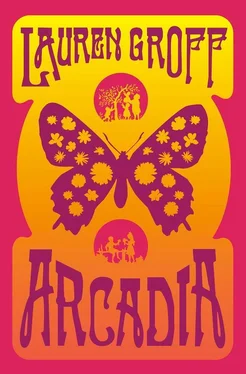
![Andrea Höst - In Arcadia [Touchstone - Extras]](/books/56405/andrea-host-in-arcadia-touchstone-extras-thumb.webp)




